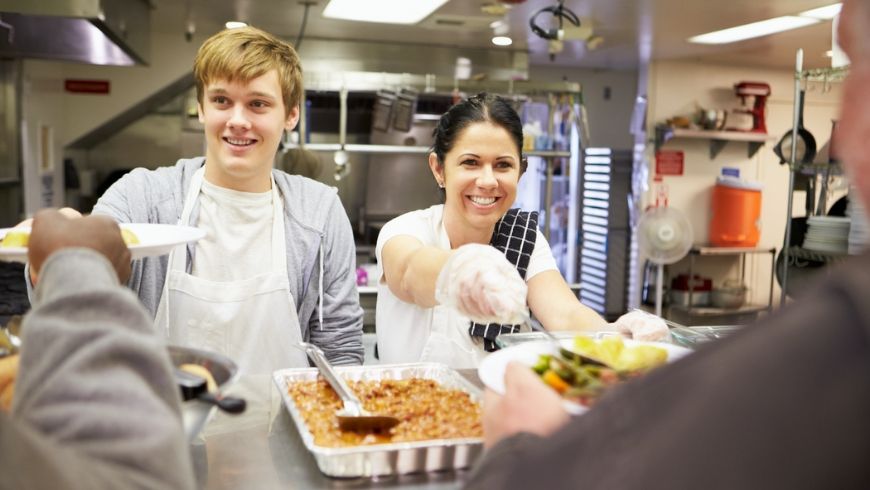Operation Nightwatch (ONW), founded in 1981 by Gary Vaughn, provides nighttime hospitality to Portland’s homeless population. And while it began as an ecumenical (Christian-based) organization nearly 40 years ago, it’s now a full-fledged 501(c)3 nonprofit. Today, it serves nearly 450 guests at two different locations each week.
Vaughn started the organization by finding giving homeless individuals socks, food, and other necessities at places where they slept at night, such as parks, underpasses, and benches.

Operation Nightwatch and Homelessness
While the Operation Nightwatch began as an outreach program — meeting the homeless population where they were — today, it’s a bit different. Executive Director Paul Underwood said “homelessness has changed a lot. Now we operate indoors at each of our locations… and we are really focused on hospitality and social connection.”
In addition to meals and basic provisions, Operation Nightwatch offers guests two very unique and critical services: mental health support and basic medical care.
Healthcare For Portland’s Homeless
Kolin Busby, a staff member at ONW, once lived on the street himself and is in active recovery from addiction. Busby works at their Downtown location on Thursday, Friday, and Saturday nights. He makes himself available to anyone who walks in and offers suicide prevention, goal setting, emotional support and more. “One of the most amazing things I have seen at Operation Nightwatch is how people have changed — their sense of self-esteem and drawing on their strengths. I adore our folks. This is home.”
Rachel Morris, the healthcare coordinator at ONW, provides basic medical services such as wound care, over-the-counter medication, and even foot care to guests. Foot care is critical because it prevents infections sores from lack of proper footwear and weather exposure. It also provides a gentle, human touch. Morris shares that this is a special service for unhoused individuals because it “allows them to take all of their stress and just let it go.” She adds that “it opens conversations to everything else that’s going on in their life.”
Because ONW’s services are highly individualized, ongoing involvement and commitment is required. The organization consists of four staff members and a team of volunteers. And that’s what makes Operation Nightwatch stand out.
“You can’t lose that personal touch,” shared a guest. “Without that, you lose the sincerity of your intent.”
Operation Nightwatch's Goal
The organization’s mission statement says it all: “Operation Nightwatch provides night-time hospitality to the unhoused population to promote dignity and social connection.” While other shelters and outreach services provide meals and daily necessities, Operation Nightwatch also works builds a relationship with each guest that comes in their door.
“On our staff,” Underwood says, “we have three people who have Master’s degrees in Social Work.” The rest are individuals who received mental health and crisis support training. In addition, members of the Operation Nightwatch team talk to guests and support them through struggles each night.
“We focus on their self-esteem,” Underwood explains, “because when they start feeling better, they start wanting more for themselves.”
Of course, the big goal is for their services to no longer be needed. “The eradication of homelessness in Portland would be ideal.” But Underwood and his team members know that may never happen. As a result, they continue to “give people a place where they feel welcome and valued. Our goal is to just be there for them.”
The Impact of Operation Nightwatch
Because Operation Nightwatch is a “no barrier service,” it can be hard to track the exact number of guests and services they provide. “We don’t ask people to sign in, we don’t ask them for their real names. It’s not that we don’t care, it’s that we just want to be able to help them,” Underwood says. “If we want to help people where they’re at, we can’t block them at the door.”
He adds that though the average facility gets 70 to 100 people a night, “we’ve estimated that we had 23,000 guest visits to our two locations in 2017.” This includes multiple visits by the same person, which is a common (and desirable) occurrence. Operation Nightwatch staff and volunteers enjoy seeing the same faces because it means they’re benefiting and want to maintain connections within the community.
Underwood says the organization could measure how many blankets were given out, how many feet were washed, or how many people were taken to the ER. However, he says “the real impact is the dignity and the support we promote with our guests. We know we can do only so much to help somebody. The idea is that, if we can generate community, we can do more with what we have. That is our bottom line.”
The Struggles Facing Operation Nightwatch
When asked about the largest obstacle Operation Nightwatch faces as a nonprofit, Underwood gave an unexpected response. “Honestly, it’s maintaining hope. The challenges that are present in the homeless community are enormous. It’s easy to get bogged down and hopeless, and to anticipate how much worse it gets for these people. You talk about hope and you see people taking a step forward and making a difference, and it can all end.” Sadly, Operation Nightwatch has lost guests to suicide, addiction, and accidents. Actively building a community means that the nonprofit faces these hardships together. Still, it can be difficult to solve the obstacles guests face
But Underwood has an antidote to hopelessness:
We can’t look at solving hopelessness. For me, it’s not ‘How do we fix this thing?’ It’s ‘How can we make a difference?’ If everyone finds something and starts doing it, things will get better.
That’s why Operation Nightwatch wants to connect with businesses and volunteers willing to make a difference.
Volunteering in Portland
According to Underwood, Portland is very engaged in volunteerism. Operation Nightwatch averages about five or six volunteers per night at each location. That means about 25 volunteers per weekend, with over 1,300 volunteer roles filled each year. That doesn’t account for the organization’s highly engaged Board members, such as the “Tuna Team” making tuna sandwiches, volunteers making PB & J sandwiches, volunteers collecting and delivering blankets, or the people who pick up food donations.
The most important benefit for Operation Nightwatch volunteers is breaking down their own stigmas.
“To us, [volunteers] can reduce the stigma around homelessness and mental health,” Underwood says. “The greatest way I know to change that stigma is to change people’s views.” And while they have a wide range of volunteers running services that Operation Nightwatch provides, Underwood would also like to see more involvement from the Portland’s business community. That’s why Operation Nightwatch is teaming up with NobleBridge.
Partnering with Portland’s Business Community
While Operation Nightwatch currently partners with churches and community centers, Underwood would like to see a stronger connection with Portland businesses. “We work with a lot of ecumenical organizations,” he says. “I’d like to see the same kind of relationship with businesses.” He called on local businesses to take a more active role in the community.
By doing so, Underwood and his team believe that the stigmas around homelessness and mental health can be debunked even faster. “When leaders in our community take the time to open minds and hearts to what’s going on — then speak out on those issues — it carries a lot more weight,” he shares. “I think that’s the benefit to us and to Portland as a whole.”
In partnership with the NobleBridge program, Operation Nightwatch hopes to connect with Portland-area businesses that want to make a differnece. For Underwood and his team, the solution isn’t to throw money at the problem. Rather, it’s about being engaged and providing a personal connection that can make a difference for Portland’s homeless community.
“To the business leaders, what I would say to them is: this will deepen the impact of what you do. It will strengthen teams who aren’t just chasing that buck and it makes for a richer experience in this life.”
How To Help Portland's Homeless
Operation Nightwatch Portland operates two facilities each week:
- Nightwatch SE at the Clackamas Service Center. They offer showers, a hot meal, community, and conversation on Fridays from 7:00 to 9:00 p.m. and Saturdays from 5:00 to 8:00 p.m.
- Downtown Hospitality Center at St. Stephen’s Episcopal Church. They serve homeless individuals by providing conversation, games, foot care, and more on Thursdays, Fridays, and Saturdays from 7:00 to 11:00 p.m.
Are you ready to join the movement and mobilize your volunteers? Connect with the NobleBridge Community today.
NobleBridge is a volunteer initiative started by TreeTop Commons, LLC. It’s designed to pair businesses with nonprofits and charities. It’s goal is to create a strong volunteer culture in Portland and make it easier for people to find volunteer opportunities. NobleBridge hopes to make Portland the #1 corporate volunteer city in the United States. We want to help businesses create and foster a culture of volunteerism with their employees.
Since 2007, NobleHour has proven to be the volunteer management solution for organizations across the nation. With its robust online platform, NobleHour enhances community engagement with a variety of innovative and transformative tools for finding, tracking, and measuring volunteer initiatives. With offices in Lakeland, FL, and Portland, OR, the NobleHour team is dedicated to empowering good in communities across the country.
By NobleHour Special Contributor:

Latasha Doyle
Consultant, NobleHour
Contributing Writer
Denver, Colorado
Latasha Doyle is a writer and long term care volunteer living outside of Denver, Colorado. When she’s not writing or volunteering, she enjoys crocheting, Netflix marathons, and planning her next trip.
